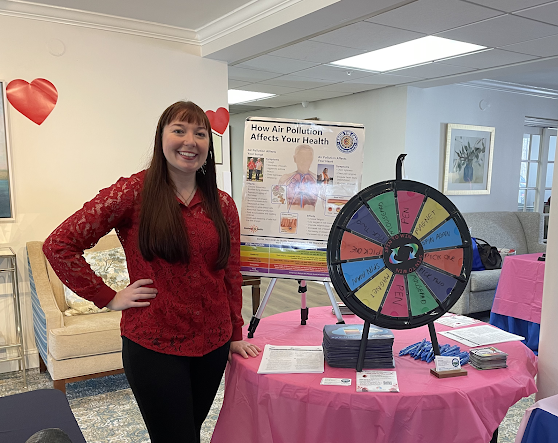February is American Heart Month!
What’s Up, Forsyth?? This February isn’t just about Valentine’s Day, it’s also American Heart Month. Did you know that small pollution particles in our air could lead to big problems for our hearts?
When we discuss the health effects of air pollution, we
often focus on breathing problems or lung disease, but certain types of air
pollution, particularly fine particulate matter (PM2.5), can worsen existing cardiovascular (heart
or blood vessel) disease or even contribute to the development of disease. According to the US Environmental Protection Agency (EPA), “exposure to increased
concentrations of PM2.5 over a few hours to weeks can trigger
cardiovascular disease-related heart attacks and death. Longer-term exposure
can lead to increased risk of cardiovascular mortality and decreases in life
expectancy.”
Although habits like smoking, poor diet, and lack of exercise are
greater risk factors for heart disease than air pollution on an individual
level, research conducted by EPA and others on the US population shows that
both short and
long-term exposure to PM2.5 increases hospitalizations for serious
cardiovascular events like coronary syndrome, arrhythmia, heart failure,
stroke, and sudden cardiac death. Those with existing cardiovascular
disease (approximately 1 in 3 American adults), are at greater risk for adverse
health effects from air pollution.
The good news is that we can protect our hearts by knowing
when our outdoor air is polluted and modifying our activities on these days. By
signing up for air quality alerts through enviroflash.info, you can receive the
daily air quality forecast for your area, an alert when pollution levels reach code orange or higher, or
both. You can also visit AirNow.gov or
download the free AirNow App and type in your zip code to know the Air Quality
Index (AQI) in your area at any time. Check out EPA’s Heart Healthy Toolkit, including this informational video, for more ideas and resources!
An example of a recent air quality event that increased the
risk of heart attacks, strokes, and other cardiovascular events is the smoke
from Canadian wildfires during the summer of 2023. Millions of Americans in the
eastern United States were affected by poor air quality, and seven air quality
alerts for were issued in the Triad (Forsyth, Guilford, Alamance, Davidson,
Davie, Randolph, Rockingham, Caswell, and Stokes counties).
Visible
smoke from Canadian wildfires as seen in downtown Winston-Salem on June 29,
2023.
While awareness during large-scale events like these is critical, it’s important to remember that smaller, localized fires like the Sauratown
Mountain fire in November 2023 can also affect the health of those in closer
proximity. Smoke from events like these may not necessarily trigger an air
quality alert for an entire air quality forecasting region, so if you live
close to an active fire but the forecasted AQI for that day is still 100 or
lower, remember that PM concentrations could be higher where you are and to
exercise caution when outdoors. If you check the Triad Air Quality Forecast,
pay attention to the discussion section for more details and health guidance,
if applicable.
Wildfire on
Sauratown Mountain on November 19, 2023 as seen from Pilot Mountain State Park.
Other activities that can produce unhealthy amounts of PM include burning leaves and brush, which is only permissible under certain conditionsin Forsyth County, and burning trash, which is ALWAYS illegal in North Carolina. Campfires, wood stoves, and fireplaces also increase PM, but using best-wood burning practices can reduce concentrations. Higher PM concentrations are also found in areas with heavy traffic, especially in urban areas during rush hour. Reduce or eliminate exposure to these situations, especially if you have heart or lung disease. For questions or more information, please call our office (336-703-2440).






Comments
Post a Comment